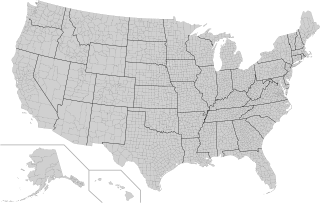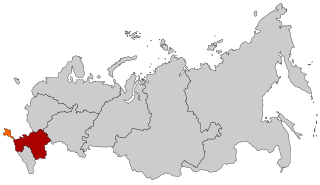
The Sovereign Military Order of Malta (SMOM), officially the Sovereign Military Hospitaller Order of Saint John of Jerusalem, of Rhodes and of Malta, and commonly known as the Order of Malta or the Knights of Malta, is a Catholic lay religious order, traditionally of a military, chivalric, and noble nature. Though it possesses no territory, the order is often considered a sovereign entity under international law.

In the United States, a county or county equivalent is an administrative or political subdivision of a U.S. state or other territories of the United States which consists of a geographic area with specific boundaries and usually some level of governmental authority. The term "county" is used in 48 states, while Louisiana and Alaska have functionally equivalent subdivisions called parishes and boroughs, respectively. Counties and other local governments exist as a matter of U.S. state law, so the specific governmental powers of counties may vary widely between the states, with many providing some level of services to civil townships, municipalities, and unincorporated areas. Certain municipalities are in multiple counties; New York City is uniquely partitioned into five counties, referred to at the city government level as boroughs. Some municipalities have been consolidated with their county government to form consolidated city-counties, or have been legally separated from counties altogether to form independent cities. Conversely, counties in Connecticut and Rhode Island, eight of Massachusetts's 14 counties, and Alaska's Unorganized Borough have no government power, existing only as geographic distinctions.

A federated state is a territorial and constitutional community forming part of a federation. A federated state does not have international sovereignty since powers are divided between the other federated states and the federal government. Unlike international sovereign states, which have what is often referred to as Westphalian sovereignty, federated states operate under their domestic or federal law with relation to the rest of the world.

The Genealogical Office is an office of the Government of Ireland containing genealogical records. It includes the Office of the Chief Herald of Ireland, the authority in Ireland for heraldry. The Chief Herald authorises the granting of arms to Irish bodies and Irish people, including descendants of emigrants. The office was constituted on 1 April 1943 as successor to the Ulster King of Arms, established during the Tudor period of the Kingdom of Ireland in 1552. The Ulster King of Arms' duties in relation to Northern Ireland were taken over by the Norroy and Ulster King of Arms.
A dependent territory, dependent area, or dependency is a territory that does not possess full political independence or sovereignty as a sovereign state and remains politically outside the controlling state's integral area. As such, a dependent territory includes a range of non-integrated not fully to non-independent territory types, from associated states to non-self-governing territories.
Freedom of association encompasses both an individual's right to join or leave groups voluntarily, the right of the group to take collective action to pursue the interests of its members, and the right of an association to accept or decline membership based on certain criteria. It can be described as the right of a person coming together with other individuals to collectively express, promote, pursue and/or defend common interests. Freedom of association is both an individual right and a collective right, guaranteed by all modern and democratic legal systems, including the United States Bill of Rights, article 11 of the European Convention on Human Rights, section 2 of the Canadian Charter of Rights and Freedoms, and international law, including articles 20 and 23 of the Universal Declaration of Human Rights and article 22 of International Covenant on Civil and Political Rights. The Declaration on Fundamental Principles and Rights at Work by the International Labour Organization also ensures these rights.

The Southern Federal District is one of the eight federal districts of Russia. Its territory lies mostly on the Pontic–Caspian steppe of Southern Russia. The Southern Federal District shares borders with Ukraine, the Azov Sea, and the Black Sea in the west, and Kazakhstan and the Caspian Sea in the east.
An associated state is the minor partner or dependent territory in a formal, free relationship between a political territory and a major party—usually a larger nation.

Republika Srpska is one of the two entities of Bosnia and Herzegovina, the other being the Federation of Bosnia and Herzegovina. It is located in the northern and eastern parts of the country and had a population of 1,228,423 according to the 2013 census. The largest city and administrative center is Banja Luka, situated on the Vrbas River.

The president of Hungary, officially the president of the republic, is the head of state of Hungary. The office has a largely ceremonial (figurehead) role, but may also veto legislation or send legislation to the Constitutional Court for review. Most other executive powers, such as selecting government ministers and leading legislative initiatives, are vested in the office of the prime minister instead.

The Federation of Bosnia and Herzegovina is one of the two entities composing Bosnia and Herzegovina, the other being Republika Srpska. The Federation of Bosnia and Herzegovina consists of ten autonomous cantons with their own governments and legislatures.

The federal subjects of Russia, also referred to as the subjects of the Russian Federation or simply as the subjects of the federation, are the constituent entities of Russia, its top-level political divisions. According to the Constitution of Russia, the federation consists of republics, krais, oblasts, cities of federal importance, an autonomous oblast, and autonomous okrugs, all of which are equal subjects of the federation.

The International Fitness and BodyBuilding Federation (IFBB) is an international professional sports governing body for bodybuilding and fitness. Headquartered in Las Rozas de Madrid, it oversees many of the sport's major international events, notably the World and Continental Championships.

Municipalities are the second-level administrative divisions of Mexico, where the first-level administrative division is the state. They should not be confused with cities or towns that may share the same name as they are distinct entities and do not share geographical boundaries. As of March 2024, there are 2,460 municipalities in Mexico, adding the 16 boroughs of Mexico City to constitute 2476 territorial units.

The Constitutional Court of Bosnia and Herzegovina is the interpreter and guardian of the Constitution of Bosnia and Herzegovina. It has the appellate jurisdiction over issues arising out of judgments of any other court in the country, including the constitutional courts of the two entities and the Court of Bosnia and Herzegovina.
The Confederation of Independent Football Associations (CONIFA) is the international governing body for association football teams that are not affiliated with FIFA.
A campaign finance reform amendment refers to any proposed amendment to the United States Constitution to authorize greater restrictions on spending related to political speech, and to overturn Supreme Court rulings which have narrowed such laws under the First Amendment. Several amendments have been filed since Citizens United v. Federal Election Commission and the Occupy movement.











